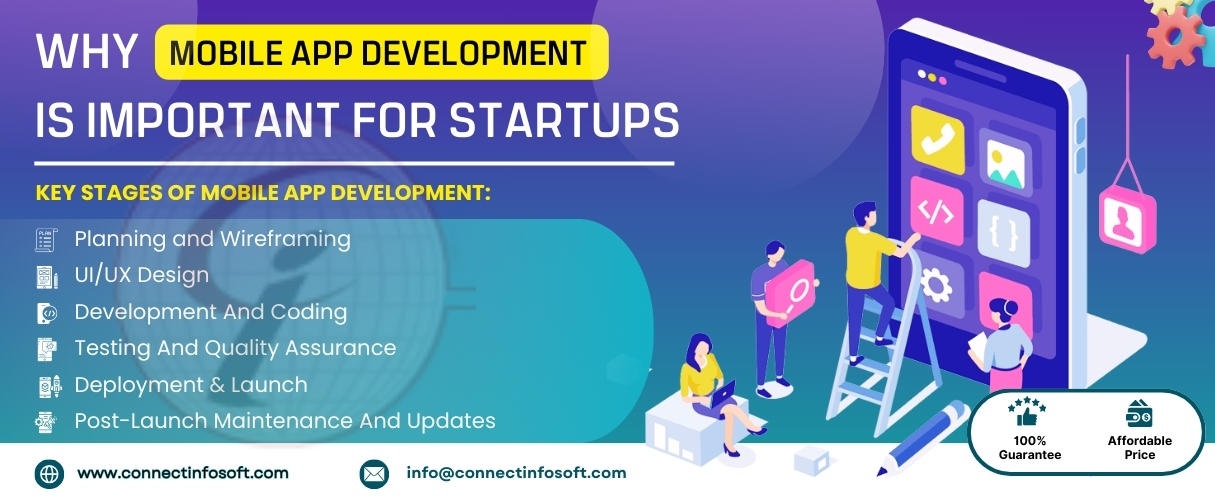Understanding the Basics of Mobile App Development for Startups | Connect Infosoft

Mobile Applications have become an integral part of business success. Startups can avail the mobile app for increasing the busyness of the customer, streamlining operations and skillfully. However, developing a mobile app from scratch can be heavy, especially for people unfamiliar with the process.
Fundamentals Of Mobile App Development For Startups, Assisting Entrepreneurs For Launching A Successful App.
Why Is The Development Of Mobile Apps Important For Startups:
Increasing dependence on mobile devices has changed consumer behavior. With more than 6 billion smartphone users worldwide, businesses must use mobile-first strategies to remain competitive. Mobile apps offer startups a unique opportunity to engage customers, enhance user experience, and drive growth.
- Increase brand visibility and recognition
- Improve customer experience and engagement
- Increase revenue through in-app purchases or membership
- Organize business procedures and operations
- Get valuable insight from user data and analytics
Define Your Mobile App Idea:
Before diving into development, the startup must have a clear vision of their mobile app. There should be a well-defined app idea:
- Solve a specific problem or meet a requirement in the market
- Identify target audiences and their preferences
- Offer a unique value proposition compared to competitors
Conducting Market Research:
The market research app plays an important role in refining the concept. Understanding industry trends, analyzing competitive apps, and requesting feedback from potential customers can all contribute to the development of a successful product.
Choosing The Right Platform: Android, iOS, or Both:
The startup must determine whether to produce an app for Android, iOS or both platforms. Each has its own set of advantages:
- Android: Large global market share, more flexibility in adaptation, and easy app approval process.
- IOS: High revenue capacity, better security facilities, and a more busy user base.
For startups with budget constraints, opting for one platform initially and expanding later can be a strategic move. Alternatively, cross-platform development using frameworks like React Native or Flutter can reduce costs and development time.
Choosing The Appropriate Development Approach:
There are three primary techniques for mobile app development:
- Native App Development: Develop apps for Android and iOS using platform-specific programming languages (Java/Kotlin for Android, Swift for iOS). It provides excellent performance but requires additional resources.
- Cross-Platform Development: Using Framework such as react native or Flutters to creating a single codebase for both platforms that save time and money on development.
- Progressive web apps: Web-based applications that offer a mobile-like experience without requiring installation. Ideal for startups looking for a budget-friendly solution.
Key Stages of Mobile App Development
A. Planning and Wireframing
Creating a blueprint of the app, define features and designing user interfaces (UI) via wireframe and prototype.
B. UI/UX Design
A seamless and intuitive user experience (UX) is important for the success of the app. The app must be visually attractive, easy to navigate and aligned with brand identity.
C. Development and coding
The actual development phase where the backend (server, database) and frontend (user interface, interaction) of the app have been created. Developers use various programming languages and outlines depending on the selected platform.
D. Testing and quality assurance
The rigid test ensures that the app is free from bug, security weaknesses and performance issues. Startups should conduct the usability testing, performance testing, and security audits before launch.
E. Deployment & Launch
Once the app is tested and ready, it is submitted to the Google Play Store and Apple App Store for approval. A well- planned marketing strategy is required for a successful launch.
F. Post-launch maintenance and update
Regular updates, bug fixes, and feature enhancement user help to maintain connectivity and keep the app relevant in the competitive market.
Common Challenges In Mobile App Development For Startup:
- Limited budget and resources: Startups will have to allocate their budget wisely and give priority to the necessary facilities.
- Selection of the right technology stack: Selecting wrong technology can cause display issues and scalability problems.
- User retention and engagement: Getting users is a challenge; They require continuous improvement and updates to maintain them.
- Safety and Data Security: User data is important for obtaining the trust and compliance with the rules to ensure the app privacy and app safety.
The Best Practice For Successful Mobile App Development:
- Start with a minimum viable product (MVP): Launching MVP allows startups to test your concept and assemble user reactions before investing heavy.
- Note User Experience (UX): A user-friendly interface and spontaneous experience gives rise to high retention rates.
- Leverage Cloud Services: Cloud-based solutions can reduce the cost of infrastructure and improve the app scalability.
- Implement Agile Development Methodology: The agile functioning allows continuous recurrence and improvement, reduces growth risks.
- Use analytics and feedback: Tracking user behavior and response app helps in making data-operated decisions for app.
Conclusion
Mobile app development for startups includes careful planning, strategic execution and continuous improvement. By understanding the basic things, selecting the right approach and following the best practices, startups can create a successful mobile app that runs development and customer engagement.
At Connect Infosoft, we are experts of mobile app development to suit the unique needs of startups. Whether you are looking for native, cross-platform, or PWA solution, our expert team can bring your app idea to life.
Contact us today to kickstart your mobile app journey!


